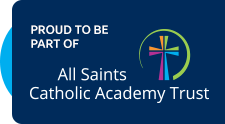Learning
This page is awaiting content

St Cuthbert Mayne Catholic Junior School
Growing together in love
and learning as followers of Jesus


This page is awaiting content
Formed in 2016, as part of the Diocese of Westminster's Academy Strategy, we provide a collaborative structure of school support and innovation for Catholic schools in South West Hertfordshire. Our vision of an 'Outstanding Education for All' comes from this desire to enable all members of school communities to flourish and succeed and to do all that we can to make our schools places where ambition for all is at the heart of everything that we do.
Visit Site